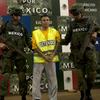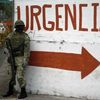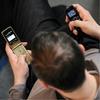Brooke Gladstone appears in the following:
Reporting via Placemat
Friday, June 22, 2012
"Alejandra," a reporter who was threatened by the Zeta cartel, began to publish news on place mats that she sold to local restaurants. Brooke talks to "Alejandra" about her determination to report in the face of threats to her and her family.
Mexico's Image Problem
Friday, June 22, 2012
Mexico has an image problem around the world, exacerbated by stories of violence and corruption —not to mention lingering stereotypes from the era of the Frito Bandito. Brooke talks to a number of people grappling with Mexico's image problem.
Paco de Lucia & Rámon Algeciras - Cielito Lindo
The Risks for Journalists in Mexico
Friday, June 22, 2012
Brooke talks to Mike O’Connor of the Committee to Protect Journalists about the risks that reporters face in a country beset by drug-violence, often targeted at the media.
Violence against journalists in veracruz
Friday, June 22, 2012
Veracruz, home of the bloody Zeta cartel, is now the most dangerous place in Mexico to be a journalist. Nine journalists have been killed in the last 12 months alone. Brooke travels to Veracruz to talk to journalists about reporting under a constant threat of violence.
Elizabeth - Soy Loca Por Ti
Brooke Gladstone on Mexican Elections and the Media
Tuesday, June 12, 2012
On the Media host Brooke Gladstone reports from Mexico on that country's upcoming presidential elections, its campaign laws, and Yosoy132, the movement being called the Mexican Spring.
Ray Bradbury Dies at 91
Friday, June 08, 2012
Earlier this week, science fiction writer Ray Bradbury died. Bradbury is the author of Fahrenheit 451 and many, many other books. Brooke explains how her love of science fiction began with Bradbury.
How British Science Journalists are Secretly Undermining the American Media
Friday, June 08, 2012
Slate writer Daniel Engber set out to debunk the idea of the 5-second rule -- the myth that if you drop food on the floor and pick it up quickly, it’s still clean enough to eat. Engber's quest led him onto a bigger story, about a wellspring of scientific misinformation that's flowing into American papers from Britain.
Retraction Watch
Friday, June 08, 2012
There's often a really interesting story behind a retraction. That's what Ivan Oransky told us. He's a doctor and journalist and founder, along with Adam Marcus, of a blog called Retraction Watch. They monitor scientific journals and investigate why articles were retracted. They uncovered serious ethical breaches at a variety of journals. Oransky tells Brooke about some of the stories he's covered this year.
Quantic - Una Tarde en Mariquita
Scientific Retractions on the Rise
Friday, June 08, 2012
When a paper released by a scientific journal turns out to be wrong, either due to human error or intentional fraud , the journal’s editors often will issue a retraction advising scientists to disregard the research. A Wall Street Journal study has found the number of such retractions to be soaring. New Yorker science writer Jonah Lehrer tells Brooke what he thinks is going on.
Covering the Apocalypse
Friday, June 08, 2012
Even if you're not among those who believe the world will end on 12/21/2012, it's gotta end sometime right? And if there are still journalists at the end, they'll need a game plan. At a recent journalism pow-wow, the role of journalists in two apocalyptic scenarios -- global pandemic and alien invasion -- were discussed with funny and useful results. Brooke speaks with Andrew Fitzgerald who suggested the topic.
Balancing Advocacy and Accuracy
Friday, June 01, 2012
In a Washington Post op-ed last month, Senator Joseph Lieberman spoke of “horrific human rights abuses perpetrated daily, including the widespread and deliberate use of rape and other sexual violence as weapons of war.” Lauren Wolfe, director of the Women Under Siege Project, which has curated a map plotting instances of sexual violence in Syria, talks with Brooke about trying to check the senator's claim and the difficulty of verifying claims of rape in a war-zone.
The Chieftains - The Stone
Combatants and "Combatants"
Friday, June 01, 2012
According to an article in The New York Times last week, the Obama administration treats “all military-age males in a strike zone as combatants”. Brooke talks to Chris Woods, reporter for the Bureau of Investigative Journalism, who has been working with reporters on the ground to confirm and put names to civilian casualties of drone strikes, about the discrepancies between his reporting and the reports of the US government.
Chinese Censorship Gets Complicated
Friday, June 01, 2012
Chinese censorship is nothing new. But recently the relationship between censor and dissident has grown more complicated as the government comes to accept that social media is no longer something it can simply take away from Chinese citizens. Brooke speaks with Slate's Jacob Weisberg, who recently traveled to China and spoke with some tech-savvy new dissidents.
Lit - My Own Worst Enemy
How We Watch TV
Friday, May 25, 2012
There are a lot of ways to watch TV -- free streaming online, via a traditional cable or satellite package, paying for services like Hulu Plus, etc. But the TV industry makes vastly different amounts of money depending on how you choose to watch. We invited Peter Kafka, media reporter for the website All Things Digital to play the part of a mustache-twirling cable baron and explain which of our staffers have viewing habits he can support and why.
Earle Hagen and Herbert W. Spencer - The Fishin' Hole
Red Foley - Television
TV Hijackers
Friday, May 25, 2012
On a Sunday evening in the late 1980's, two or more unknown men hijacked the signal for two Chicago area TV stations. They broadcast a spooky, subversive, disturbing message -- twice. Brooke talks to Bohus Blahut, a Chicago broadcaster, who saw the broadcast and was unable to forget it.
Doctor Who Theme - Delia Derbyshire/Ron Grainer
When is it OK to Spoil?
Friday, May 25, 2012
People who watch TV when it actually airs and blab about it online can ruin it for those of us who watch shows at our leisure. Their excited Twitter chatter about the great twist in last night’s Mad Men is frustrating if you haven’t yet watched last night’s Mad Men. New Yorker TV critic Emily Nussbaum is a prolific tweeter who began grappling with this problem after Twitter users complained about a phenomenon they called Nussbombing. She talks to Brooke about her evolving system of spoiler etiquette.
Big Joe Turner - TV Mama
Producing Television for the Internet
Friday, May 25, 2012
The world of shows produced expressly for consumption on the web seems to be expanding rapidly, attracting not only amateurs with cameras, but seasoned Hollywood veterans. Brooke talks to Thinkprogress.org culture reporter Alyssa Rosenberg, and the co-creators of the web series Husbands, Brad Bell and Jane Espenson,
What's the Harm in Hate Speech?
Friday, May 18, 2012
One of the great maxims in defense of the 1st Amendment is the insistence by Justice Oliver Wendell Holmes that we must defend 'even the thought we hate'. But law professor Jeremy Waldron asks, when it comes to the most egregious hate speech, why? He explains to Brooke that words can and do hurt us and that there should be limitations on the most hateful expression.
The Future of the Phone
Friday, May 18, 2012
The text message turns two decades old this year, and numerous studies have shown a sharp decline in actual phone use in favor of texting and email. Brooke talks to writer Tom Vanderbilt, who says the phone call’s day may be passing.
JD Samson and MEN - Life's Half Price
When Freedom of the Press is Not a Priority
Friday, May 18, 2012
Leaders in Ethiopia and Rwanda were once hailed as political reformers. But according to Mohamed Keita, of the Committee to Protect Journalists, Western priorities have led African democracies to narrow their free speech commitments. Mohamed speaks to Brooke about the frightening consequences when press freedoms drop off the agenda.



















